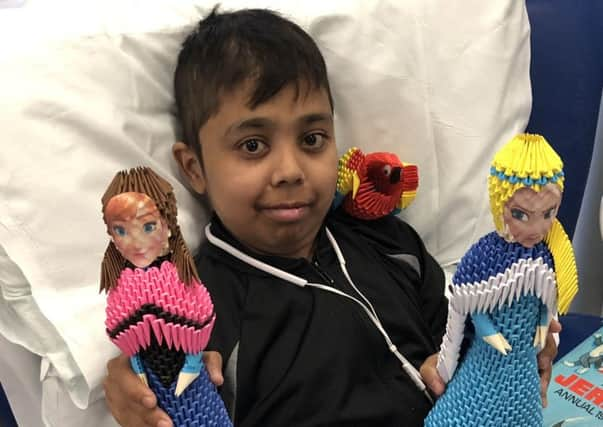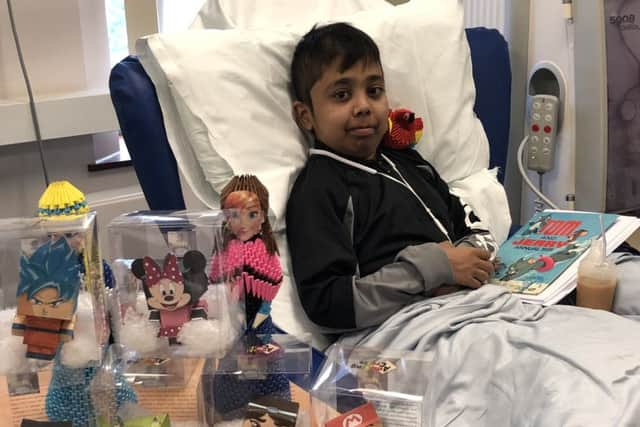How origami helped kidney patient


Spending hours on life-saving dialysis can become boring, but one Yorkshire kidney patient has found an usual way of filling the time.
Aaqif Khan, 23, has used the time he’s spent receiving treatment to become an expert in the Japanese art of origami.
Advertisement
Hide AdAdvertisement
Hide AdHe now sells some of his paper creations he makes while receiving kidney dialysis three times a week at St Luke’s Hospital’s Renal Dialysis Unit, part of Bradford Royal Infirmary.


The former Shipley College student has spent a significant amount of time in hospital throughout his life while battling the rare congenital nephrotic syndrome, which often leads to acute kidney failure and can affect growth.
Around one in every 50,000 children are diagnosed with the condition each year.
It tends to be more common in families with a history of allergies or those of an Asian background, although it’s unclear why
Advertisement
Hide AdAdvertisement
Hide AdAaqif has found comfort, a hobby and now a fledgling business in the ancient art of paper folding.


“I had my first kidney transplant aged four in Leeds, which failed, and then a second aged eight, from my Dad, which was successful,” explains Aaqif.
“It lasted for 15 years but then started to fail in March this year. I came back into hospital to have an AV graft fitted and have been having dialysis again since April.
“This summer, I also went back on the kidney transplant register.”
Advertisement
Hide AdAdvertisement
Hide AdAaqi, of Undercliffe, Bradford, first learnt the art of origami aged eight while recovering from his second kidney transplant.
He has since gone on to master the complex skill of 3D origami, which sees practitioners use hundreds of sheets of paper to create striking sculptures without using a single drop of glue.
This branch of origami is made using multiple triangular units which are connected together to form a single design.
Each triangle is made from a rectangular sheet of paper, and multiple colours and patterns are used to create more life-like models.
Advertisement
Hide AdAdvertisement
Hide AdAaqif has become so adept at the ancient artform that he has also set up his own business selling the models.
Paper parrots, frogs and penguins have all recently emerged from his fingertips, as well as models of fictional Hollywood heroes and heroines.
But his main aim is to find a new kidney and then pass on his folding skills to children from throughout the district.
“If anyone out there is willing to donate a kidney, we all really need one,” he adds.
Advertisement
Hide AdAdvertisement
Hide Ad“If you get a kidney you can do so much more with your life.
“It’s not ideal if you are stuck to a dialysis machine three times a week, as after you’ve been to dialysis most of your day is gone. But what I really want to do is teach young people and people in similar situations to me how to do origami.
“I’d love to teach children from youth centres and after-school clubs.
“I really like origami because it’s really creative and keeps your mind off things. It’s great to be able to create 3D models from flat pieces of paper.”
Advertisement
Hide AdAdvertisement
Hide AdAaqif often practises his skills while receiving dialysis three times a week at the dialysis unit, and recently presented ward clerk Maureen Cain with a giant swan to say thank you for her support.
She said: “I was absolutely blown away by it. I couldn’t believe how clever it was.
“He is very talented and we are so proud of him!”
The majority of renal services at Bradford Teaching Hospitals are delivered at St Luke’s Hospital, but the team also supports activities at Bradford Royal Infirmary, Airedale General Hospital and Skipton Hospital.
The team look after more than 250 dialysis patients and nearly 400 transplant patients in addition to a large number of people with a wide variety of kidney conditions.
Advertisement
Hide AdAdvertisement
Hide AdAcross the UK, more than 1,000 people each year donate a kidney or part of their liver while they are still alive to a relative, friend or someone they do not know.
A healthy person can lead a normal life with only one functioning kidney and may donate the other to help someone in need of a kidney transplant.
Part of a liver can also be transplanted from a living donor to help someone in need of a transplant.
For more information visit www.organdonation.nhs.uk/about-donation/living-donation/ or http://www.giveakidney.org/